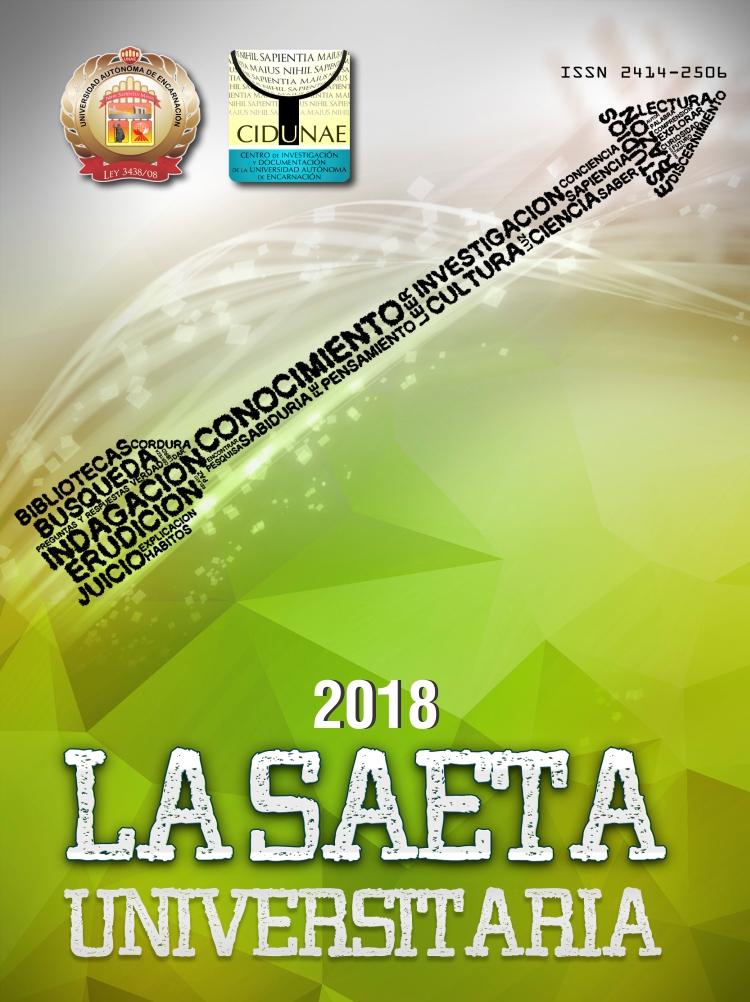Human Rights and Mentally Ill Patients: A necessary discussion
DOI:
https://doi.org/10.56067/saetauniversitaria.v7i1.123Resumen
This research analyses the situation of mentally ill patients and human rights. The subject is justified because it brings contributions for the legal perspective, especially the right to health. The goal of this investigation is to verify some psychiatric hospitals and methods of treatments around the world as well discussing legislations aspects, with a special view on the Brazilian Psychiatric Reform and its anti-asylum law – Lei Antimanicomial – that brought improvements for the protection of patients and non-abusive treatments. The methodology used in this research follows the hypothetical-deductive method and consists mainly from bibliographic analysis through books, dictionaries, newspapers, periodicals, articles, official databases, national and international laws as well as the use of all types of materials and instruments available on the Internet. It was possible to demonstrate that our contemporary society still struggles when dealing with mentally ill individuals. The psychiatric institutions analyzed in Serbia, Mexico, Brazil, Lithuania, India and Indonesia, demonstrated strong violations of human rights, discrimination, social exclusion, lack of public health policies, lack of infrastructure, mistreatment and suffering. It was also discussed the issues of voluntary and involuntary internment, social exclusion and social inclusion. We concluded that we have to break up this paradigm based on exclusion. It’s necessary to deconstruct the idea that a mentally ill individual is incapable or dangerous. The States have the responsibility to protect violations of human rights, but in some point, we have to remember that we’re all human beings and we all have to be treated in respectful way.
Keywords: Discrimination. Insanity. Mistreatment. Right to Health
Descargas
Citas
Ahmedani, B. K. (2011). Mental health stigma: society, individuals, and the profession. Retrieved from: https://www.ncbi.nlm.nih.gov/pmc/articles/PMC3248273/ Access in: Mar. 12, 2018.
Appelbaum, P. S. (1982). Can mental patients say no to drugs? Retrieved from: http://www.nytimes.com/1982/03/21/magazine/can-mental-patients-sayno-to-drugs.html?pagewanted=all Access in: Mar. 06, 2018.
Bozelko, C. (2015). Hospital or jail: connecticut mental illness care lacking. Retrieved from: http://www.courant.com/opinion/op-ed/hc-op-bozelkomentally- ill-in-jail-0118-20150116-story.html Access in: Mar. 15, 2018.
Brasil. (2001). Lei nº 10.216, de 6 de abril de 2001. Retrieved from:
http://www.planalto.gov.br/CCIVIL_03//LEIS/LEIS_2001/L10216.htm. Access in: Ago. 12, 2018.
Brethour. D. (2017). How human rights are helping those with mental health issues. Retrieved from: https://rightsinfo.org/mental-health-mattershuman-rights-can-help-mental-health-issues/ Access in: Mar. 05, 2018.
Cambridge dictionary. Stigma. Retrieved from:
https://dictionary.cambridge.org/pt/dicionario/ingles/stigma Access in: Mar. 12, 2018.
Citizens commission on human rights. Mental health declaration of human rights.
Retrieved from: http://www.cchr.org/about-us/mental-health-declarationof-human-rights.html Access in: Mar. 06, 2018.
Gostin, L.O., Gable, L. (2004). The human rights of persons with mental disabilities: a global perspective on the application of human rights principles to mental health. Retrieved from: https://scholarship.law.georgetown.edu/cgi/viewcontent.cgi?referer=https://www.google.com.br/&httpsredir=1&article=1088&context=facpub. Access in: Mar. 26, 2018.
Hase, E. (2013). The world’s worst psychiatric institutions. Retrieved from: http://www.sickchirpse.com/worst-psychiatric-institutions/ Access in: Feb. 26, 2018.
Human rights monitoring institute. Do human rights not apply to mental hospitals? (2014). Retrieved from: https://www.liberties.eu/en/news/dohuman-rights-not-apply-mental-hospitals/2145 Access in: Mar. 05, 2018.
Jacobs, D. (2005). Suicide and clinical practice. Library of Congress Catalogingin-Publication Date: Washington, DC.
Rogers, C. (2014). Inside the 'world's most dangerous' hospital. Retrieved from: http://www.bbc.com/news/magazine-30293880 Access in: Feb. 24, 2018.
Jones, S. (2016). 'Living in hell': mentally ill people in Indonesia chained and confined. Retrieved from: https://www.theguardian.com/globaldevelopment/2016/mar/21/living-in-hell-indonesia-mentally-ill-peoplechained-confined-human-rights-watch-report Access in: Mar. 13, 2018.
Júnior, F. C.; Medeiros, M. (2007). Alguns conceitos de loucura entre a psiquiatria e a saúde mental: diálogos entre os opostos. Psicol. USP v.18 n.1 São Paulo mar. Retrieved from:http://pepsic.bvsalud.org/scielo.php?script=sci_arttext&pid=S1678-51772007000100004 Access in: Apr. 04, 2018. DOI: https://doi.org/10.1590/S0103-65642007000100004
Krishnan, L. (2015). Social exclusion, mental health, disadvantage and injustice. Retrieved from: http://journals.sagepub.com/doi/pdf/10.1177/0971333615594053 Access in: Mar. 13, 2018.
Litoff, A. (2010). The abandoned ones: 'hell' at a mexican institution. Retrieved from: http://abcnews.go.com/Health/mexican-psychiatric-institutionhell/story?id=12267276 Access in: Feb. 26 2018.
Mutabis, E. (2017). "Holocausto brasileiro" I 2016 I documentário completo. Retrieved from: https://www.youtube.com/watch?v=y6yxGzlXRVg Access in: Feb. 24, 2018.
Nicholson, L., Cooper, S. A. (2013). Social exclusion and people with intellectual disabilities: a rural–urban comparison. Retrieved from: DOI: https://doi.org/10.1111/j.1365-2788.2012.01540.x
http://onlinelibrary.wiley.com/doi/10.1111/j.1365-
2012.01540.x/epdf Access in: Mar. 13 2018.
Sen, A. (2000). Social exclusion: concept, application, and scrutiny. Retrieved from: https://www.adb.org/sites/default/files/publication/29778/socialexclusion.pdf. Access in: Mar. 18, 2018.
Sharma, G., Krishna, S. N. (2013). Mentally ill suffer a horrible fate in India. Retrieved from: http://www.dw.com/en/mentally-ill-suffer-a-horrible-fatein-india/a-17007499 Access in: Feb. 26, 2018.
Silver, H. (2007). The process of social exclusion: the dynamics of an evolving concept. Retrieved from: http://www.chronicpoverty.org/uploads/publication_files/CP_2006_Silver.pdf Access in: Mar. 13, 2018. DOI: https://doi.org/10.2139/ssrn.1087789
Szazz, T. (1978). A fabricação da loucura: um estudo comparative entre a inquisição e o movimento da saúde mental. Rio de Janeiro: Zahar.
Ventura, C. A. A. (2014). International law, mental health and human rights. Retrieved from: https://humanrights.nd.edu/assets/134859/venturamentalhealth.pdf Access in: Mar. 06, 2018.
Viladeutopia. (2017). Avanços no tratamento de doentes mentais pouco refletem na legislação. Retrieved from: https://www.viladeutopia.com.br/avancosno-
tratamento-de-doentes-mentais-pouco-refletem-na-legislacao/ Access in: Mar. 12, 2018.
World health organization. (2018). Mental health, human rights & legislation: a global human rights emergency in mental health. Retrieved from: http://www.who.int/mental_health/policy/legislation/en/ Access in: Feb. 21, 2018.
World health organization. (2007). Supporting countries to stablish mechanisms to monitor human rights in mental health facilities: the role of WHO. Retrieved from:
http://www.who.int/mental_health/policy/legislation/WHO%20Support%20to%20HR%20monitoring%20in%20MH%20facilities.pdf?ua=1 Access in: Feb. 21, 2018.
Publicado
Número
Sección
Licencia
Este obra está bajo una licencia de Creative Commons Reconocimiento 4.0 Internacional.
Los autores que publican en esta revista están de acuerdo con los siguientes términos:
- Los autores conservan los derechos de autor y garantizan a la revista el derecho de ser la primera publicación del trabajo al igual que licenciado bajo una Creative Commons Attribution License que permite a otros compartir el trabajo con un reconocimiento de la autoría del trabajo y la publicación inicial en esta revista.
- Los autores pueden establecer por separado acuerdos adicionales para la distribución no exclusiva de la versión de la obra publicada en la revista (por ejemplo, situarlo en un repositorio institucional o publicarlo en un libro), con un reconocimiento de su publicación inicial en esta revista.














